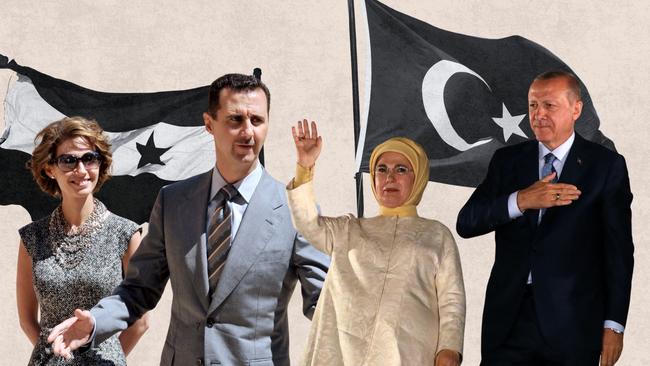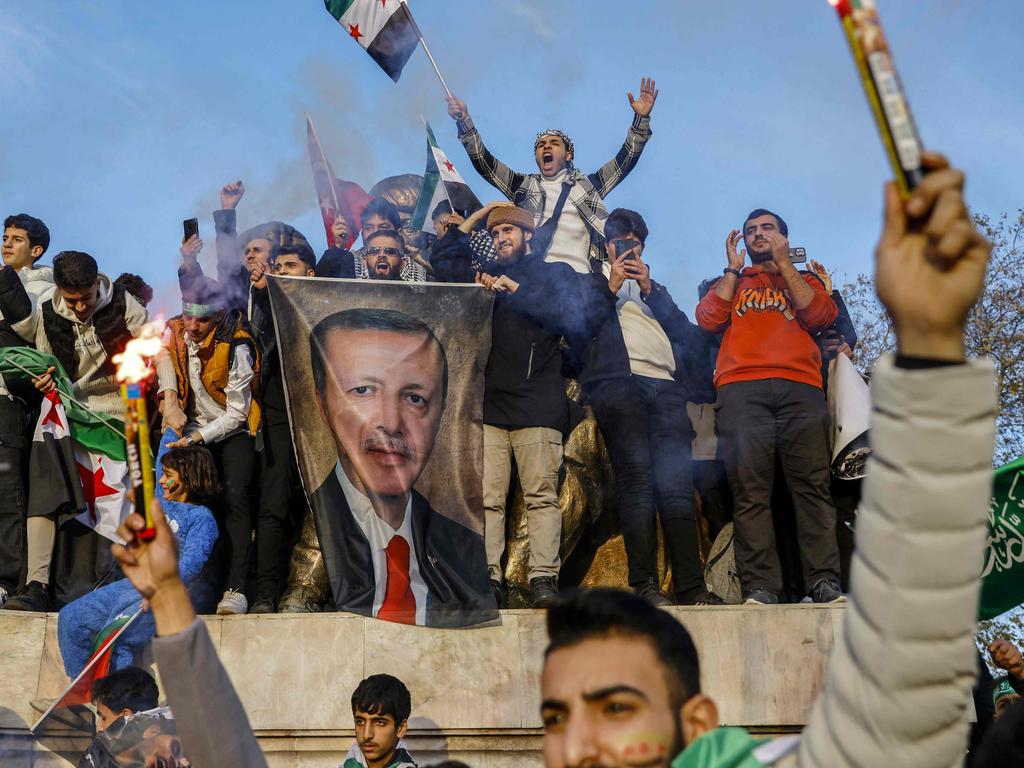From ‘brothers’ to foes: the deadly war between Erdogan and Assad

For a while Erdogan started to refer to Assad as his “brother”; trade picked up. He was fascinated by Syria as it had been in Ottoman days, home to Sunni and Shia Muslims, Alawis like the Assads, Maronite Christians, Druze, Mizrahi and Sephardic Jews. Damascus used to be the headquarters of the Ottoman Fourth Army but more importantly it was the unofficial hub of Arab political intrigue, capital of spies and the spied-upon.
So it shouldn’t have come as a surprise when Turkish intelligence picked up an exchange of private email messages between Assad and his wife Asma. Apparently another seaside couples break was being planned and Asma objected to her husband that Erdogan was a thug who had read only one book and his headscarfed wife Emine was a “shopaholic”. Erdogan was apparently furious that his wife had been disrespected. It seemed to confirm that the Assad power couple had grown too big for their boots.

The idea that Erdogan and Assad could form some kind of reformist axis was set aside. So was a central assumption of their relationship: that only a kind of enlightened autocracy could hold their societies together, a balance between the secular and the religious. For Erdogan the 2011 Arab Spring was the defining moment: the uprisings seemed to show that only political Islam, a version of rule by the Muslim Brotherhood, could shape states after the old corrupt dictatorships folded.
For Assad, as for his father before him, the 2011 demonstrations were an existential challenge that had to be put down with maximum force. Erdogan, quickly emerging as a hero of Arab rebels elsewhere, promised western officials he would push Assad to implement reforms, if only to stem the flow of Syrian refugees over his borders. When Bashar’s brother Maher viciously seized a town near the Turkish border in June 2011, Erdogan called him “brutish and inhuman”.
Then the Turkish leader sent Bashar, his former beach-buddy turned butcher, a letter demanding Maher be sacked, that patience was running out. The letter was leaked, and there was no real going back: the Assads refused to be dictated to by their heavy-handed northern neighbour. A 530-mile border does not, they said, give you a say in our governance.
What happened next was the Turkish grooming of Islamic militia groups, partly to fight against Syrian Kurds but also to narrow the Assad family’s options until the dynasty collapsed. Now that has happened and it’s plain Erdogan has come out ahead in the tortured feud with his estranged Syrian counterpart.
The Hayat Tahrir al-Sham (HTS) group, its power base in Idlib just across the border, has been tutored and armed by the Turks to present a Muslim Brotherhood-style alternative to the absent Assads. Erdogan’s secular parliamentary opponents, the CHP, warn that the HTS will create a new Afghanistan or that the path will soon be open for a return of Islamic State. But apart from the HTS leader Abu Mohammed al-Jolani demanding that women in his presence cover their hair, there has been no sign of that. Ankara is keeping HTS under tight rein and the Turkish intelligence chief Ibrahim Kalin has been spotted in Damascus.
For the first time in an often messy career, Erdogan can behave like a victor. Not just because he switched horses in Syria in good time, not just because Turkey survived war on its doorstep for decades, but also because he has avoided the careless classification of enemies. Israel, in responding to the October 7 attacks in Gaza, saw Hamas as a pushover, an unpopular fickle foe. Hezbollah in Lebanon, meanwhile, was identified as Israel’s most formidable opponent in military terms. Defeat Hezbollah (it seemed impossible for many years) and you sap Iran. These were reasonable, if too rigid, assumptions.
In fact the ideological foundation of the decapitated Hamas group has survived as part of the discourse about Gaza’s future and it is likely to rebuild on the smouldering resentment of a population dispersed in and around the Strip. Meanwhile, Hezbollah has been bombed into irrelevance. A Turkish official predicted both outcomes to me a year ago. Some sources of Hamas’s financing lead back to Turkey, where it continues to be seen as the embodiment of the Muslim Brotherhood doctrine. The destruction of Hezbollah led to the destabilisation of Assad and has exposed Iran’s soft underbelly - also a good result for Erdogan.
He now pops up everywhere. Last week he was trying to end a conflict over breakaway Somaliland by bringing together the Ethiopian and Somali leaders. His clout as a peacemaker in Africa is enhanced by providing Bayraktar drones to Ethiopia and supporting Mogadishu in its fight against the al-Shabaab terrorist group.
Erdogan wants to sit at every table but above all his ambition is to be the definitive regional powerbroker in the Middle East. America is on the way out, Russia about to lose its bases, and Muslim Brotherhood friends are in, or opposed to, governments in Egypt, Sudan, Libya and now in Syria. It’s a long, often deliberately bewildering game, and Erdogan is showing himself to be the master of it.




Both tall, thin-skinned men, neighbours in a troubled ‘hood, the Turkish strongman Recep Tayyip Erdogan and the younger, gawky Syrian leader Bashar al-Assad got on well enough to holiday together with their wives in the ritzy seaside resort of Bodrum. Erdogan saw potential in Assad. It was 2008 and the Syrian was beginning to look comfortable in power for the first time, brimming with modernisation plans.